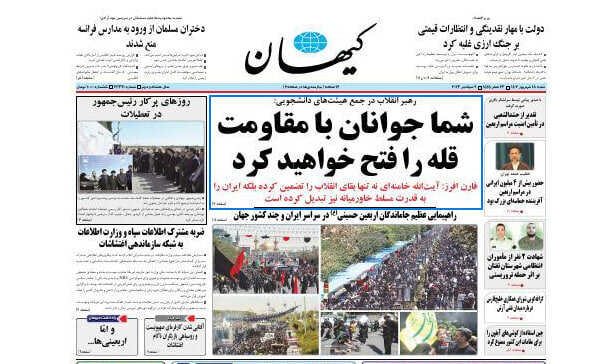The failure of Zionist-dominated media against Iran

In a commentary, Kayhan discussed the meeting of Gila Gamliel, the Zionist regime’s spy chief in London with several colleagues of a hostile TV channel.
The paper said: According to Gamliel, Iran continues its threat not only against Israel but also in other places in the world.
Barak Ravid, a famous Zionist journalist, and Yossi Melman, an intelligence analyst for Haaretz, revealed that the Mossad regularly uses the Iran International TV channel for the spy war against Iran and that the TV belongs to the Mossad, and the information and materials that it does not want to publish in its name, publishes through this channel. The disclosure of the communications of the Iran International broadcaster and similar foreign networks is at a time when some Western-leaning elements inside Iran were in full coordination with those networks during last year's riots. The disclosure of the role of Mossad and similar criminal services behind the scenes of hostile media, while some domestic media work in harmony with those foreign media, or basically, the content produced by them is exactly reflected in these media and they have only created a cover for treason.
Iran: Washington's bogus excuse for seizing Iran's oil cargo
In an analysis, the Iran newspaper addressed the unloading of seized Iranian oil cargo by the United States and said: After the American companies refused to unload Iran's seized oil cargo, Washington was forced to unload the oil cargo under the pressure of Congress. Suez Rajan was an oil tanker carrying 800,000 barrels of Iranian oil, which the U.S. seized months ago under the pretext of its unilateral sanctions against Iran. Iran considered the U.S. action a clear example of oil theft and reacted to it by seizing two oil tankers in the Strait of Hormuz. A group of lawmakers from both the Democratic and Republican parties wanted Joe Biden last month to complete the seizing process, and called the delay in unloading it unacceptable. Finally, the United States found an excuse to unload the oil cargo despite being worried about Iran's reaction. It was seized under the pretext that Iran was smuggling the cargo to China. This action led to summoning the Swiss charge d'affaires in Tehran to the Ministry of Foreign Affairs as Switzerland serves as the protector of the U.S. interests in Iran.
Hamshahri: Iran and Saudi Arabia are negotiating over the Arash gas field
The (Persian) Gulf Cooperation Council (GCC) issued a statement at the end of its meeting by claiming that "only Saudi Arabia and Kuwait have the full right to tap the resources of the Arash/Dorra gas field", Hamshahri reported. For seven years when relations between the Islamic Republic of Iran and Saudi Arabia had been cut, Kuwaiti allied with Riyadh to improve its diplomatic power to resolve the gas field issue with Iran. Moreover, considering Iran's Khark and Kuwait's Failaka islands in the Persian Gulf, as well as the existence of a common neutral zone between Kuwait and Saudi Arabia, the issue of the Arash gas field has become complicated. And, according to some experts, it is the most complicated “political geography” in all the seas around the world. In March 2022, Kuwait and Saudi Arabia signed an agreement to share the resources of the Arash gas field, which prompted the Islamic Republic of Iran to protest. In recent months and in the 13th government and with the acceleration of the process of normalization of relations between Iran and Saudi Arabia, hopes have emerged that the two countries, in addition to solving various problems, find a solution to exploit the gas field as well.
Shargh: Progress towards understanding
In a note, Shargh discussed Iran's nuclear issue. It wrote: Iran has reduced its enrichment rate which stood at 60% and accordingly no resolution is going to be issued against Iran in the IAEA Board of Governors meeting, which will start on Monday in Vienna. In such an atmosphere, everyone is hoping that not only the tension between Tehran and Washington will not increase, but also there may be ways to resume negotiations to revive the JCPOA. However, for now, everything revolves around a verbal understanding and not a written and reliable agreement. Some observers also believe that due to the domestic and international considerations of Washington and the Joe Biden government’s fear of taking risks, the White House does not want to destroy the hope of negotiation and an agreement, and that negotiations may be underway to reveal the resulting deal at once. Especially as Iran and the 4+1 group (Britain, France, Russia, and China as permanent members of the UN Security Council and Germany), according to some news, will hold talks on the sidelines of the UN General Assembly in New York this month. Probably, these negotiations will include other indirect negotiations between Iran and the United States.
Leave a Comment